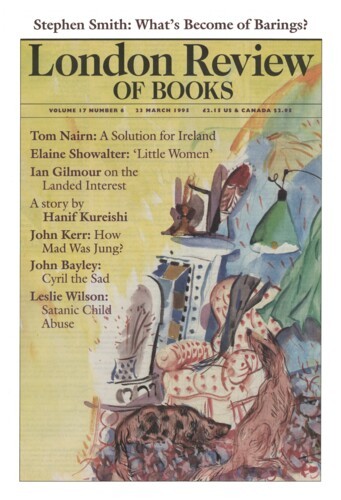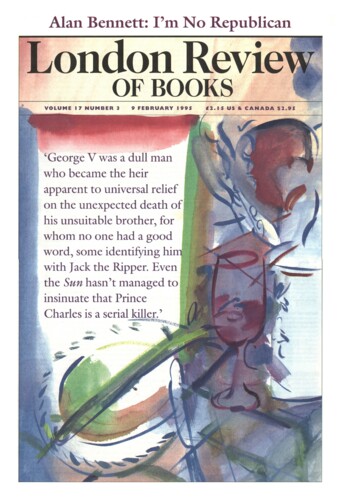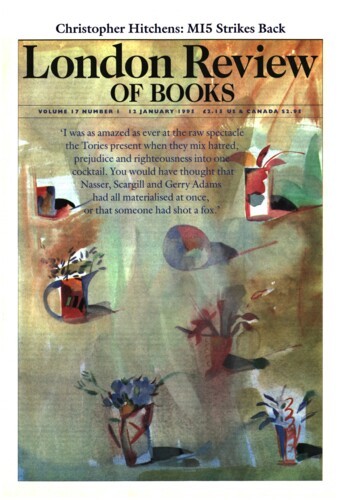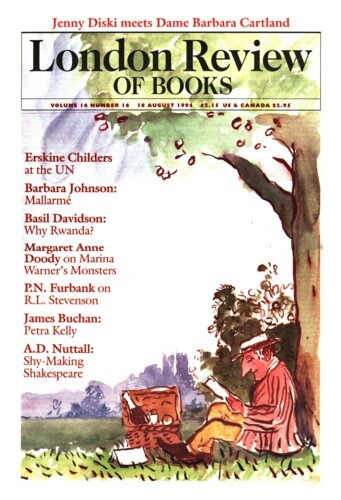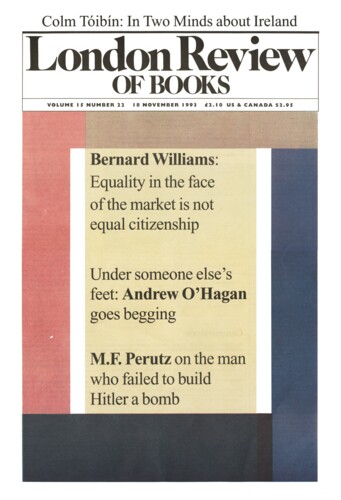Patrick Parrinder
Patrick Parrinder is a reader in English at the University of Reading. His books include Authors and Authority and Science Fiction: Its Criticism and Teaching. A study of James Joyce has recently appeared.
Over-Indulging
Patrick Parrinder, 9 February 1995
Like his elder contemporary Henry James, Eça de Queirós belongs to the small and distinguished group of 19th-century novelists who wrote in exile. He was born in 1845 in a remote town of northern Portugal, but spent most of his working life in England and France. He liked to maintain that his novels were fundamentally French, and that he himself was French in everything but his fondness for ballad-singers and cod with onions. Certainly he was no Englishman, nor likely to become one, despite 14 years spent in the consular service in Bristol and Newcastle-upon-Tyne. His sparkling Letters from England, contributed to a Brazilian newspaper, contain resounding denunciations of English chauvinism and of British Imperial policy in Egypt, Ireland and India. These were presumably ignored at the time by the English, just as they have ignored Portugal’s greatest novelist ever since.
The Great Copyright Disaster
12 January 1995
Rachel and Her Race
Patrick Parrinder, 18 August 1994
When Lucy Snowe goes to the theatre in Villette, she is entranced by the performance of the great actress Vashti, a plain, frail woman ‘torn by seven devils’, a ‘spirit out of Tophet’ delighting her audience with a glimpse of hell. Vashti is easily identified as the tragedian Elisa Rachel, whom Charlotte Brontë had seen in London in 1851. Sarah Bernhardt may be better known today, but it was Rachel who haunted the English literary imagination throughout the 19th century. In James’s The Tragic Muse, the Jewish Cockney actress Miriam Rooth claims to be in the same style as ‘that woman’, and George Eliot’s Gwendolen Harleth foolishly thinks of herself as destined for stardom because she is more beautiful than the ‘thin Jewess’.
Flying the flag
Patrick Parrinder, 18 November 1993
Cheered on by the Tory faithful, John Major recently dismissed as ‘claptrap’ a letter signed by 500 university teachers of English attacking the proposed revisions to the National Curriculum. The academics were accused – falsely, I believe – of wanting to undermine the teaching of Shakespeare. A few months earlier, the Education Secretary John Patten sent back an official report on English in schools with the comment that 15-year-olds perhaps ought to be made to study the ‘great tradition of the novel’. There have been solemn consultations about this with educational experts, and it remains to be seen whether Mr Patten’s opinions will become part of a legally enforceable literary canon.’
Pieces about Patrick Parrinder in the LRB
Devil take the hindmost
John Sutherland, 14 December 1995
Among other certain things (death, taxes etc) is the rule that no work of science fiction will ever win the Booker Prize – not even the joke 1890s version. H.G. Wells’s The Time...
Outside the Academy
Robert Alter, 13 February 1992
These two meticulous surveys of modern criticism in all its vertiginous variety lead one to ponder what it is all about and where it may be heading. The book by René Wellek, focused on...
Post-Humanism
Alex Zwerdling, 15 October 1987
When the history of late 20th-century literary culture comes to be written, the extraordinary vogue of metatheoretical works will surely require explanation. What can account for the obsessive...
Raiding Joyce
Denis Donoghue, 18 April 1985
Patience is a mark of the classic, according to Frank Kermode. ‘King Lear, underlying a thousand dispositions, subsists in change, prevails, by being patient of interpretation.’ It...
Read anywhere with the London Review of Books app, available now from the App Store for Apple devices, Google Play for Android devices and Amazon for your Kindle Fire.
Sign up to our newsletter
For highlights from the latest issue, our archive and the blog, as well as news, events and exclusive promotions.
